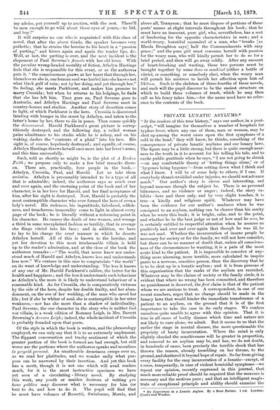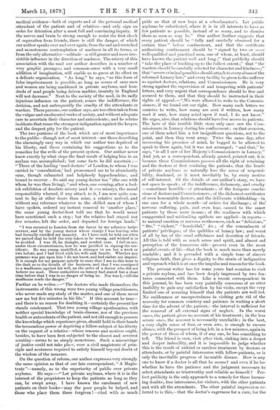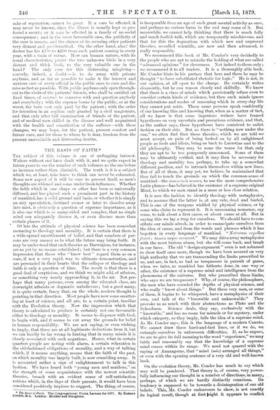PRIVATE LUNATIC ASYLlTMS.*
"Ii' the readers of this true history," says our author, in a post- script, "will imagine for themselves a number of hospitals for typhus fever, where any one of them, man or woman, may be shut up among the worst cases upon the first symptoms of a cold in the head," they will know, he thinks, something of the consequences of private lunatic asylums and our lunacy laws. The figure may be a little strong, but there is quite enough near- ness to the truth in it to account for his telling his tale, and to excite public gratitude when he says, "I am not going to shrink —on any comfortable theory of letting things alone,' or of bygones being bygones '—from setting down what I think and what I know. I will be of some help to others, if I can. If everybody thumb-twiddled under injuries, we should not advance much." Our author's story is clever and interesting, sad beyond measure though the subject be. There is no personal bitterness, and no violence or anger ; indeed, the story ex- hibits—here and there only, and by very slight touches, it is true—a kindly and religious spirit. Whatever may have been the evidence for our author's madness when he was consigned to an asylum, nothing can be clearer than his sanity when he wrote this book ; it is bright, calm, and to the point, and whether he be the best judge or not of how mad he was, he is certainly entitled to respectful attention when he assures us positively and over and over again that though he was ill, he was not mad. Whether the incarceration of insane people be necessary for society or for the family, we will not here consider, but there can be no manner of doubt that, unless all conscious- ness of the circumstances be wanting, it is a pain of the most acute kind to the patient. It is impossible to conceive of any- thing more alarming, more terrible, more calculated to inspire panic to a nervous, sensitive person, than the discovery that he is to be shut up in a lunatic asylum ; and it is from persons of this organisation that the ranks of the asylum are recruited. Whatever may be the claims of society or the family circle, it is evident that where no wrong has been committed, and therefore no punishment is deserved, the first claim is that of the patient whom we are anxious to treat. A correspondent, in one of our recent numbers, urges that no change should be made in the lunacy laws that would hinder the immediate transference of a patient to an asylum, on the ground that it is of the first importance to take the case in its early stages. We confess ourselves quite unable to agree with this opinion. That it is true in all cases of bodily disease which time and nature are not likely to cure alone, we admit. But it seems to us that the earlier the stage in mental disease, the more questionable the propriety of hasty incarceration. Where the mind is only slightly clouded the sensitiveness will be greater in proportion, and removal to an asylum may be, and has, we do not doubt, in hundreds of cases, been precisely the terrible shock that has thrown the reason, already trembling on her throne, to the ground, and shattered it beyond hope of repair. So far from giving every facility for the easy incarceration of a lunatic—except, of caurse, temporarily, in case of violent homicidal symptoms—we repeat our opinion, recently expressed in this journal, that much more reliable proof should be required that the measure is necessary and the motives pure ; and that an intelligent magis- trate of exceptional principle and ability should examine the * My Experiences in a Lunatic Asylum. By a Sane Patient. 1 vol. London: Chatto and Windue.
medical evidence—both of experts and of the personal medical .attendant of the patient and of relatives—and only sign an order for detention after a most full and convincing inquiry. If the nerves and brain be strong enough to resist the first shock of separation from friends, there is still the danger, of which our author speaks over and over again, from the sad and wretched and monotonous contemplation of madness in all its forms, or from the only alternative—solitude—a still greater and more irre- sistible influence in the direction of madness. The misery of this association with the mad our author describes in a number of very graphic passages ; and common-sense with a very small addition of imagination, will enable us to guess at its effect on a delicate organisation. "As long," he says, "as this form of false imprisonment is possible, as long as scores of sane men and women are being maddened in private asylums, and hun- dreds of mad people being driven madder, insanity in England will not decrease." Next to the society of the mad, in its sadly injurious influence on the patient, comes the indifference, the derision, and not unfrequently the cruelty of the attendants or warders. These persons, our author says, are too often taken from the vulgar and uneducated ranks of society, and without adequate care to ascertain their character and antecedents ; and he relates incidents that rouse the strongest indignation against the keeper, and the deepest pity for the patient.
The two portions of the book which are of most importance to the public—though not of most interest—are those describing the alarmingly easy way in which our author was deprived of his liberty, and those containing his suggestions as to the remedies for the evils of the present system. Our author never knew exactly by what steps the final result of lodging him in an asylum was accomplished; but some facts he did ascertain :— "Three of the leading ' mad-doctors ' of London, to whom I was carried in 'consultation,' had pronounced me to be abundantly sane, though" exhausted and helplessly hypochondriac, and bound to recover. . So said my young doctor too" (the one with whom he was then living), "and when, one evening, after a fool-
ish exhibition of desolate misery (and it was misery), the moral responsibility whereof, if any attach to it, I am now quite con- tent to lay at other doors than mine, a relative arrived, and without any reference whatever to the skilled men of whom I
have spoken, ordered my instant removal to 'another place,' the same young doctor-host told me that he would never have sanctioned such a step ; but the relative had stayed but five minutes, left the order, and departed for foreign lands."
"I was escorted to London from the forest by my adhesive body- servant, and by the young doctor whose charge I was leaving, who had formally certified my insanity. As I have said, he told me when we parted that he held the step taken to be wrong, and wished it to be avoided. I was ill, he thought, and needed care. I fail to see, under these circumstances, how he was justified in signing the cer- tificate. He was young, unskilled, a stranger to me but a week or two before, and I had lived with his wife and family. Whether any pressure was put upon him I do not know, and had rather not inquire. It is enough for my purpose quietly to state that I am to this hour in the dark as to the details of the business, and that I was consigned to a madhouse, against his will, on the order of a doctor who did not believe me mad. Three authorities on lunacy had stated but a short
time before that I was in no danger of being so. Nor was the madhouse made the danger."
Further on he writes :—" The doctors who made themselves the instruments of this wrong were two young village practitioners, who never made any study of the matter, and one of them never saw me but five minutes in his life." If this account be true— and there is no reason for doubting it—certainly the present law stands condemned. That two young village apothecaries, with neither special knowledge of brain-disease, nor of the previous health or antecedents of the patient, and not old enough to possess the knowledge which experience gives, should hold in their hands the tremendous power of depriving a fellow-subject of his liberty on the request of a relative—whose reasons and motives ought, besides, to have been first subjected to the closest and severest scrutiny—seems to us simply monstrous. Such a miscarriage of justice could not take place, were a civil magistrate of prin- ciple and acuteness required to satisfy himself beyond doubt of the wisdom of the measure.
On the question of reform, our author expresses very strongly the same opinion as that of our late correspondent, "A Magis- trate "—namely, as to the superiority of public over private asylums. He says :—" Let private asylums, where it is in the interest of the proprietors to keep the patients as long as they can, be swept away. I have known the enrolment of new patients on their books—may the poor people be helped, and those who place them there forgiven I—cited with as much pride as that of new boys at a schoolmaster's. Let public asylums be substituted, where it is in all interests to have as few patients as possible, instead of as many, and to dismiss them as soon as may be." Our author :further suggests that every patient should be "fully and carefully observed for a certain time" before confinement, and that the certificate authorising confinement should be "signed by two or more well-qualified and practised men, one of whom, at least, should have known the patient well and long ;" that publicity should "take the place of hushing-up to the fullest extent ;" that "the warders should be carefully selected for character and kindness ;" that "severe criminal penalties should attach to every abuse of the reformed Lunacy law;" and every facility be given to the sufferer as against doctors, relations, and Commissioners. He is very strong against the supervision of and tampering with patients' letters, and very urgent that correspondence should be free and assured to them, and that they should be instructed in their rights of appeal :—".We were allowed to write to the Commis- sioners, if we found out our right. How many such letters we contrive to write, how many are sent if written, how many read if sent, how many acted upon if read, I do not know." He urges, also, that relations should have free access to patients. The hero of this terrible little story only once saw the Com- missioners in Lunacy during his confinement ; on that occasion, one of them asked him a few insignificant questions, not to the point, and then they went away. Twice the same day, after recovering his presence of mind, he begged to be allowed to speak to them again, but it was not arranged ; "and that," he says, "is all I saw of her Majesty's Commissioners in Lunacy." And yet, as a correspondent, already quoted, pointed out, it is because these Commissioners possess all the right of retaining and the doctors of first confining the patients, that the heads of private asylums so naturally lose the sense of responsi- bility, deadened, as it must inevitably be, by every motive of self-interest. Of the details of our author's story, we have not space to speak ; of the indifference, dishonesty, and cruelty —sometimes horrible—of attendants ; of the foregone conclu- sions of doctors and Commissioners ; of the dishonest certificates of even honourable doctors, and the deliberate withholding—in one case for a whole month—of orders for discharge ; of the nervous suffering, pain, and even fear, caused to the saner patients by those more insane ; of the readiness with which exaggerated and misleading epithets are applied—in reports— to natural emotion or nervous restlessness, such as "delusions," "fits," "violent," "homicidal," &c.; of the concealment of patients' privileges ; of the quibbles of lunacy law ; and worst of all by far, of the cruel selfishness and desertion of friends. All this is told with so much sense and spirit, and almost sad perception of the humorous side—present even in the most painful events of life—that the book is much more than merely readable ; and it is pervaded with a simple tone of sincere religious faith, that gives a dignity to the strain of indignation and reproach which is at once the impulse and reason for the book.
The present writer has for some years had occasion to visit a private asylum, and has been deeply impressed by two fea- tures connected with them. Like a recent correspondent in this journal, he has been very painfully conscious of an utter inability to gain any satisfaction by his visits, except the very limited one of assuring himself that the patients are well fed. No suddenness or unexpectedness in visiting gets rid of the necessity for common courtesy and patience in waiting a short time for the advent of the patient,—the interval is sufficient for the removal of all external signs of neglect. In the worst cases, the patient gives no account of his treatment ; in the less severe ones, the account is necessarily unreliable ; in the best, a very slight sense of fear, or even awe, is enough to ensure silence, with the prospect of being left, in a few minutes, again in the power of those of whom, if of any one, he has something to tell. The friend is seen, visit after visit, sinking into a deeper and deeper imbecility, and it is impossible to judge whether this is the result of unkind or careless treatment by doctors or attendants, or by painful intercourse with fellow-patients, or is only the inevitable progress of incurable disease. How is any one to know if a doctor is all that he seems ? and even if he be, whether he have the patience and the judgment necessary to select attendants as trustworthy and reliable as himself ? Per- fect publicity is the only approach to a remedy for these harass- ing doubts ; free intercourse, for visitors, with the other patients and with all the attendants. The other painful impression re- ferred to is this,—that the doctor's eagerness for a cure, for the sake of reputation, cannot be great. If a cure be effected, it may never be known, since the illness is usually kept so pro- found a secret; or it may be effected in a family of no social consequence ; and in the most favourable case, the publicity of the cure is remote, and the chance of its securing other patients very distant and problematical. On the other hand, alas ! the doctor has his £150 to L-250 from each patient coming in every year, with a train of extras. How can human nature, with its usual characteristics, prefer the two unknown birds in a very distant and thick bush, to the very valuable one in the hand? The only cure for this distressing misgiving— scarcely, indeed, a doubt — is to do away with private asylums, and as far as possible to make it the interest and anxious care of every official in the public ones to cure and dis- miss as fast as possible. With public asylums only open through- out to the visits of the patients' friends, who shall be entitled (at fixed times, of course) to converse with and question anybody and everybody ; with the expense borne by the public, or at the worst, the bare cost only paid by the patient; with the order for detention in an asylum only granted by a civil magistrate, and that only after full examination of friends of the patient, and of medical men skilled in the disease and well acquainted with the health and constitution of the sufferer—with these changes, we may hope, for the patient, present comfort and future cure, and for those to whom he is dear, freedom from the present unavoidable and distressing doubts.




































 Previous page
Previous page